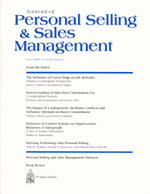
This study examines the effects of goal setting on salesperson effort and new product sales. Employing the motivation hub’s theoretical framework, company-assigned goals (i.e., quotas), self-set goals, and self-efficacy are modeled as antecedents to selling effort and new product sales. To investigate the model, longitudinal data were collected from 143 industrial salespeople and combined with objective data from company records. The strength of this multisource, longitudinal data set allowed several important time-dependent relationships to be tested in the model. Seemingly unrelated regressions were employed to address the unique challenges the data provided. Results from the analysis reveal evidence of a nonlinear relationship between self-set goals and effort. Specifically, salespeople expend more effort as goal levels increase up to a certain point. Beyond this threshold, selling effort decreases as goal levels increase. The study also indicates that self-set goals fully mediate the relationship between assigned goals and selling effort. Finally, the longitudinal data indicate that company-assigned goals, self-set goals, and selling effort all positively infl uence future new product sales. Interestingly, the results of the study fail to confirm an inverted, U-shaped relationship between assigned goals and effort which opens up further questions for future research. Both theoretical and managerial implications are discussed based on this new evidence.









